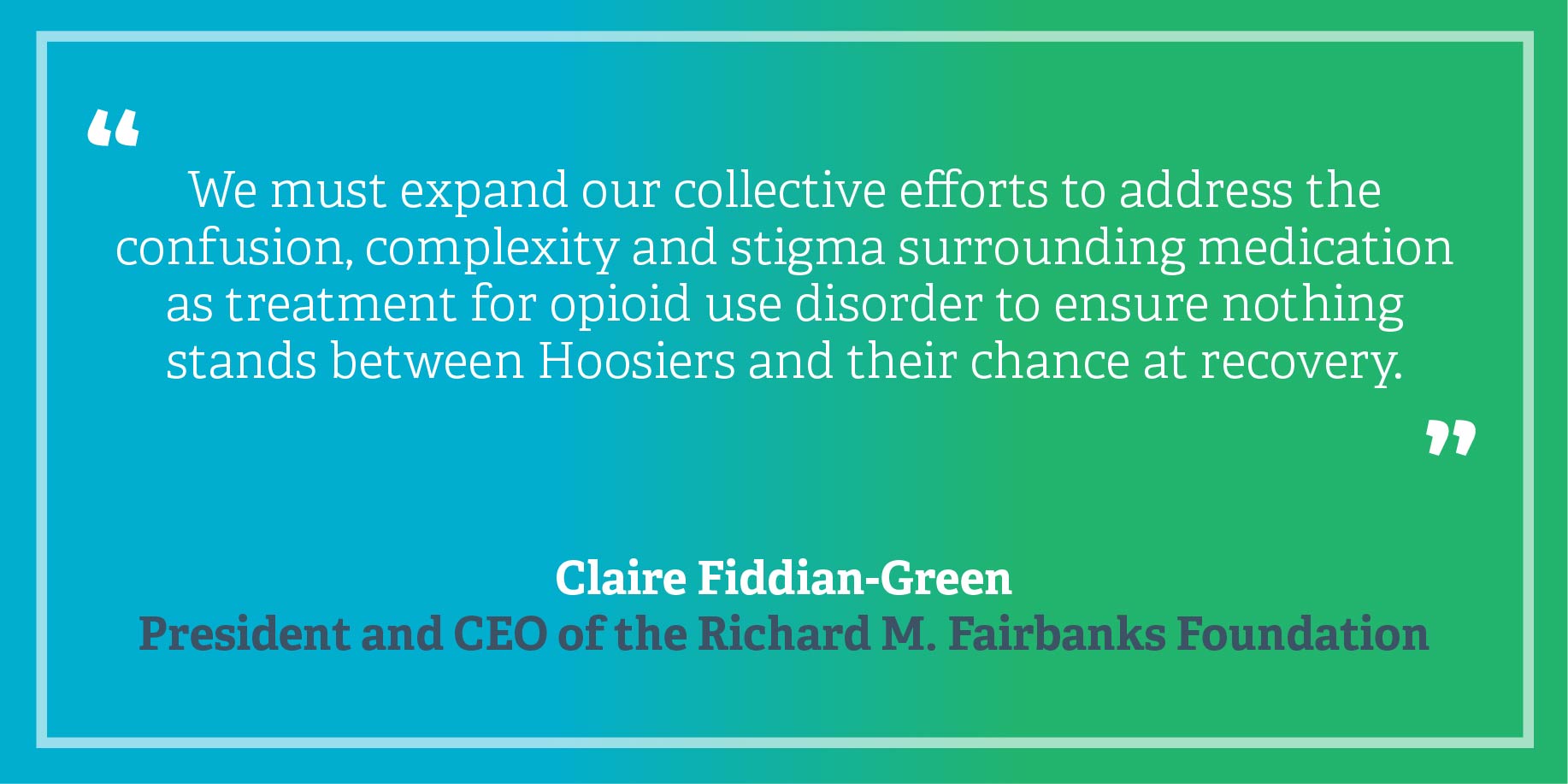Study Finds System-wide Barriers to Accessing Medication for Opioid Use Disorder in Indianapolis
Treating opioid use disorder (OUD) with medication has proven to improve outcomes for people suffering from the disease, but an analysis commissioned by Richard M. Fairbanks Foundation shows that while such treatment and related services like counseling are available in Indianapolis, accessing them can be confusing and complicated. As a result, many Indianapolis residents who misuse opioids are not able to access timely and evidence-based treatment at the critical moment they are ready to start the path to recovery.
The assessment was conducted by the American Institutes for Research (AIR). Researchers found that stigma around treating OUD with medications such as methadone and buprenorphine—a practice known as Medication for Opioid Use Disorder (MOUD)—keeps too many Indianapolis residents from getting the treatment they need. The study also identified barriers—including lack of access to transportation and stable recovery housing, and conflicts between treatment-providers’ hours and patients’ work schedules—that underlie Indianapolis’ challenging treatment landscape.
“Evidence shows that MOUD is the gold standard of care for people struggling with opioid use disorder, and medication should be one of the first things offered,” said Claire Fiddian-Green, president and CEO of the Richard M. Fairbanks Foundation. “The state and treatment providers have made positive strides on improving access to treatment. Now, we must expand our collective efforts to tackle barriers around stigma, cost and difficult-to-navigate systems to ensure nothing stands between Hoosiers and their chance at recovery.”
More than 360 Marion County residents died from drug overdoses in 2017—the most recent year for which complete data are available. That amounts to 38.9 fatal overdoses per 100,000 people, compared with a state rate of 29.4 fatal overdoses per 100,000 people.
Identifying a treatment provider can be challenging because online information about available services often conflicts with the treatment options that organizations share over the phone. What’s more, once a provider is identified, the process for accessing services can be arduous, with limited availability, inconvenient locations and complex intake procedures. And lack of insurance repeatedly came up as an initial barrier that can delay care, particularly for individuals without the ability to pay out of pocket.
“I recently received a Facebook message from someone searching for guidance on where he could get help for opioid use disorder,” said Justin Phillips, founder and executive director of Overdose Lifeline. “This shows just how confusing the landscape of services can be. Hoosiers are looking for consistent information and need access to medicine at the moment they’re ready to start recovery. That can be the difference between life and death.”
Over the last few years, the State of Indiana and treatment providers have made efforts to broaden access to medication as treatment for opioid use disorder. One example of this is an online tool launched by OpenBeds to help Hoosiers navigate treatment options. To build on these efforts and improve MOUD access, the AIR report made the following recommendations:
- Develop a centralized substance use disorder intake and assessment process that incorporates a brief assessment of patients’ needs and also includes information about treatment options for all substance use disorders. This integration is key since many people with OUD also misuse other substances, and many treatment providers offer multiple levels of care and treatment.
- Provide more flexible treatment access, such as expanded hours and days of operation for both intake assessments and ongoing clinical services.
- Reduce barriers to initiating MOUD. It is important for those seeking methadone or buprenorphine to be able to start medication as soon as possible, ideally on the first visit.
- Increase capacity for MOUD in primary care settings, such as Federally Qualified Health Centers, which accept Medicaid and provide low-cost services to uninsured individuals.
- Train call-center, front-desk and other front-line staff who answer calls at treatment providers to be knowledgeable about what services are offered and available and the process for initiating care.
- Identify solutions to address barriers to getting to and from treatment. This could include increasing transportation funds that support ride-sharing services or mass transit.
- Increase the capacity of recovery housing/sober living services, specifically for people on MOUD and with co-occurring mental illness. For many individuals with unstable housing situations, access to low-or no-cost recovery housing is a critical component of their treatment, especially early in recovery.
- Address stigma against MOUD among abstinence-based treatment providers and the recovery community more broadly. Since MOUD is recognized as first-line treatment that reduces morbidity and mortality, it is crucial that all treatment providers understand the evidence base and work with clients who choose to use medication as part of their recovery path.
- Convene service providers, mental health providers, local government, employers and funders to problem-solve and identify funds to support gaps in services. We have an opportunity to bring together many key players for a focused discussion on systemic barriers including transportation, employment opportunities and recovery housing access.
To download the full report and see recommended actions, please visit rmff.org/insights/reports/.
ABOUT THE RICHARD M. FAIRBANKS FOUNDATION
The Richard M. Fairbanks Foundation strives to advance the vitality of Indianapolis and the well-being of its people by addressing the city’s most significant challenges and opportunities. The Foundation is focused on three issue-areas: education, tobacco and opioid addiction, and the life-sciences. To advance its work, the Foundation implements a three-pronged approach: strategic grantmaking, evidence-based advocacy, and cross-sector collaborations and convenings. Learn more at RMFF.org.

